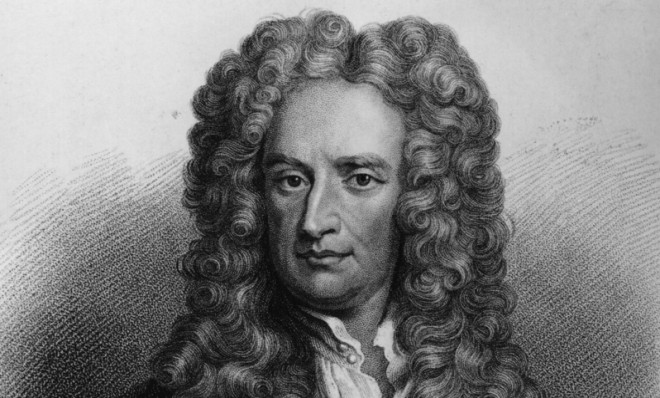The language Isaac Newton invented
Newton is credited with many, many scientific innovations. His linguistic creations, on the other hand, never really took off.


A free daily email with the biggest news stories of the day – and the best features from TheWeek.com
You are now subscribed
Your newsletter sign-up was successful
Isaac Newton laid the foundations of modern science. He discovered gravity and the principles governing motion, light, and cooling. He invented a reflecting telescope, counterfeit-proof coins, and calculus. Most of his work made a huge and lasting contribution to the state of human knowledge, but a few of his projects never made it any further than the paper they were outlined on. All generations that came after him would benefit from his innovations, but none of them would ever speak his universal language.
When Newton was a young student just beginning college, he drew up plans for a language based on the nature of things, rather than on mere convention. The idea was to "let the names of the same sorte of things begin with the same letter: as of Instruments with s; Beasts with t; The soules passions with b, etc." In this way, words wouldn't just be arbitrary labels, haphazardly assigned. You could know from hearing a word what category of thing it belonged to. Additionally, prefixes and suffixes would indicate things like whether a word was a substance or an action, the actor or the acted upon, and so on. You could know, just by hearing a word, exactly what it meant.
This idea of a universal language where the words expressed their meaning through an orderly formula was in the air in the 17th century, and Newton was no doubt aware of the efforts that others had already made toward this end. There had been various plans published for languages based on symbols, numbers, or letters. Newton's plan was based on letters, and by varying the letters in a word, you could vary its meaning in a predictable way.
The Week
Escape your echo chamber. Get the facts behind the news, plus analysis from multiple perspectives.

Sign up for The Week's Free Newsletters
From our morning news briefing to a weekly Good News Newsletter, get the best of The Week delivered directly to your inbox.
From our morning news briefing to a weekly Good News Newsletter, get the best of The Week delivered directly to your inbox.
Newton's most fully worked-out example shows how prefixes could modify the meaning of tor (temperature) to produce all its related meanings:
utor, hotowtor, exceeding hotǝwtor, very hotawtor, pretty hotewtor, very little hotiwtor, exceeding little hotetor, warmiytor, exceeding little coldeytor, very little coldaytor, indifferently coldǝytor, very coldoytor, excessive colditor, coldator, neither very hot nor coldǝtor, pretty hot or pretty coldotor, very hot or very cold
Newton tried to cram an awful lot into this one paradigm, and probably came to understand that if he wanted this degree of precision of meaning for every concept in the world, he would have to devote his life to this task. Instead, he moved on to other things. Another man of science, John Wilkins, a founding member of the Royal Society (of which Newton would later serve as president), did devote his life to the task, and would publish his own 600-page version of this type of universal language several years later. But that language, ingenious but impossible to use, quickly faded into obscurity. In deciding where to focus his energies and talent, Newton chose wisely.
A free daily email with the biggest news stories of the day – and the best features from TheWeek.com
Arika Okrent is editor-at-large at TheWeek.com and a frequent contributor to Mental Floss. She is the author of In the Land of Invented Languages, a history of the attempt to build a better language. She holds a doctorate in linguistics and a first-level certification in Klingon. Follow her on Twitter.
-
 Tourangelle-style pork with prunes recipe
Tourangelle-style pork with prunes recipeThe Week Recommends This traditional, rustic dish is a French classic
-
 The Epstein files: glimpses of a deeply disturbing world
The Epstein files: glimpses of a deeply disturbing worldIn the Spotlight Trove of released documents paint a picture of depravity and privilege in which men hold the cards, and women are powerless or peripheral
-
 Jeff Bezos: cutting the legs off The Washington Post
Jeff Bezos: cutting the legs off The Washington PostIn the Spotlight A stalwart of American journalism is a shadow of itself after swingeing cuts by its billionaire owner
